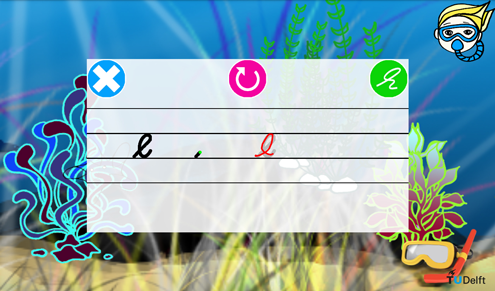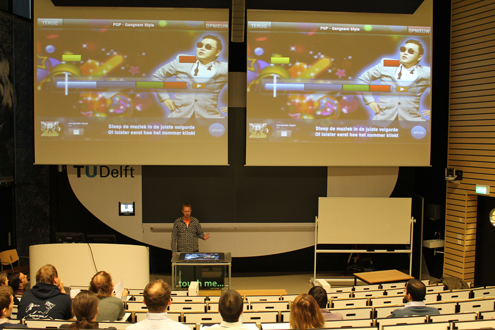In a presentation last week, three student teams demonstrated games they were commissioned to create.
The most impressive set-up is the large tabletop touch screen device known as Microsoft Surface Table.
In a presentation last week, three student teams demonstrated games they were commissioned to create.
The most impressive set-up is the large tabletop touch screen device known as Microsoft Surface Table.
It’s the medium of choice for the music game DOKjay, developed for the Delft Library DOK. Faced with a decline in interest in books from young children, DOK hopes that the new game will attract kids to the library and perhaps encourage their parents to purchase a membership.
The game is multiplayer based and it is loaded with a small number of music clips (which can easily be exchanged or refreshed by DOK employees). Each clip of about one or two minutes is chopped up in six fragments. The players have to arrange these in the right order. The game allows you to share your successes on Facebook or to store your accomplishments. But, to do that, you’ll need a library membership.
In two months, three teams of six students have designed, scripted and programmed serious games for external commissioners. To be considered serious, the games must have a purpose other than just reaching the highest score or the next level. The purpose depends upon the client.


The writing game Kleurenzee (Coloured Sea) has been developed for the educational Theo Thijsse Institute to coach children in handwriting. There’s a storyline about colourful fishes having lost their splendour as a result of a frightening shark. Children (one player at a time on an Android-based tablet) can give the fishes their colour back by delicately writing certain letters on the tablet. While demonstrating, associate professor Dr Rafael Bidarra from the faculty Electrical Engineering, Mathematics and Computer Sciences gets helpful remarks such as “please write between the lines”, “write from left to right” and “write as neat as possible”. However, it is to no avail. His handwriting is beyond rescue. The endless repetitions may stress Bidarra, but Theo Thijsse experts say that repetition is the key to learning and game testing has confirmed that children don’t mind in the least.
The last game, Enjoy The Weather, is also tablet-based and it has been developed for storm umbrella manufacturer Senz. Bidarra is not at liberty to reveal much about the game, since the Senz staff wants to take the launch of the game in their own hands. Let it suffice for the moment to say that the game’s black and white graphics are extremely stylish and that the game is both entertaining and humorous.
Android tablets seem to be the current medium of choice. Why not an iPad? Bidarra grimaces and replies that Apple has become too protectionist. The computer giant first forces you to be accredited as a developer and then blocks any distribution of the game other than via its own App Store. That’s a bit too rigid for Bidarra and his students.
Most games are in a demo phase when presented and often the students are invited to develop the game into a viable product. That happened with last year’s dentist game Teeth Defender, which is now about to be launched to distract young and frightened patients while in the dentist’s chair. The same applies for the physics game Clash of the Penguins. The game was largely stripped of its educational content and will be launched as a fun-only application.
The masters course Building Serious Games is open to all masters students, says Bidarra. This year, as before, students joined from such faculties as Industrial Design & Engineering, Aerospace Engineering and Technology, Policy & Management. And of course, some came from EEMCS itself.



Comments are closed.